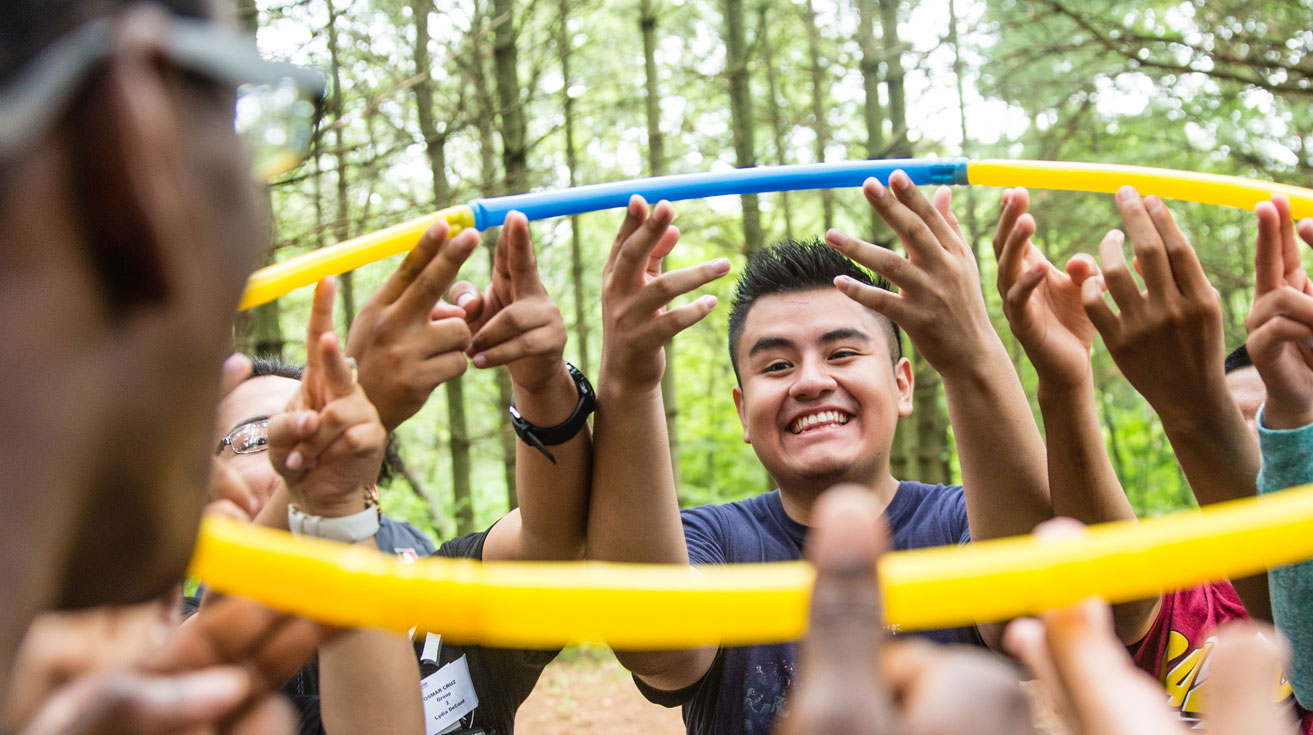Circles
Circles

Community Circles are rooted in the traditional healing practice of Circle Keeping of Indigenous peoples. Circles are a sacred process of bringing individuals together who wish to engage in supporting one another, healing, building community, resolving conflict, and making decisions. Circles are meant to promote honest communication, belonging, reciprocity, and trust. Circles are intentionally created spaces in which all participants join voluntarily and have an equal role without an established hierarchy.
Established in 2017, the SRCR Team's Community Circle Series supports personal and community empowerment at Loyola. In line with Circle Keeping practices, the Community Circle Series seeks to create spaces that promote collaboration, address harm, rebuild trust, foster belonging, and strengthen relationships. The SRCR Team is home to professional staff and student leaders who are trained Circle Keepers. The Community Circle Series offers 3-4 Circles per month during the academic year and by request.
Sign Up
Interested in learning more or signing up for an upcoming Community Circle? Follow us on Instagram! (@luccircles)
Some norms of a Circle may include:
- Be Present: We all face distractions in our daily lives. Circles present a time to focus intently on the dialogue that unfolds and truly listen to one another.
- Empowered to Speak, Priveleged to Listen: The passed talking piece empowers the holder to share their perspective. It also invites other participants to exercise their privilege of listening.
- Oops and Ouch: Participants are asked to trust that statements made in circle are made with the best of intentions. That said, occasionally the impact of our statements does not match our intent. If this happens, it is crucial to acknowledge this impact.
- Speak Your Truth: Participants are asked to speak from their own lived experiences and use “I” statements whenever possible.
- Respect Multiple Truths: Circle participants are encouraged to seek understanding rather than reach agreement. This involves respecting each individual’s truth even when it may conflict with our own.
- Said Here, Stays Here; Learned Here, Leaves Here: Privacy during a circle is key to creating a space where participants can share freely and honestly. Exceptions to this rule will be stated explicitly during a particular circle.
Why would a group participate in a Circle?
Circles have been used both preventatively and reactively. Some student groups open and close the year by participating in a circle to build rapport and create connection as a cohesive group. Other groups have participated in circles after a conflict or difficult experience to provide a safe space for participants to share their thoughts and feelings and provide closure to the experience.
What if I don't feel comfortable answering a question?
Circles are a challenge by choice activity. During the experience each participant has the opportunity to “pass” rather than respond to a question.
What if I would rather not participate?
All of our conflict resolution services are completely optional. Each party always has the option not to participate.
Is what I say confidential?
Privacy is a crucial component of the processes in the SRCR. All information shared through mediation or other conflict resolution services will be kept private, with two exceptions: 1) If there is mention of a serious violation of the Community Standards or law, a staff member would be required to act upon this information as appropriate and to ensure the safety of the community. 2) If a staff member becomes aware that someone may be in danger of serious, imminent harm, they would be required to address the situation as appropriate to ensure the safety of the community.
Community Circles are rooted in the traditional healing practice of Circle Keeping of Indigenous peoples. Circles are a sacred process of bringing individuals together who wish to engage in supporting one another, healing, building community, resolving conflict, and making decisions. Circles are meant to promote honest communication, belonging, reciprocity, and trust. Circles are intentionally created spaces in which all participants join voluntarily and have an equal role without an established hierarchy.
Established in 2017, the SRCR Team's Community Circle Series supports personal and community empowerment at Loyola. In line with Circle Keeping practices, the Community Circle Series seeks to create spaces that promote collaboration, address harm, rebuild trust, foster belonging, and strengthen relationships. The SRCR Team is home to professional staff and student leaders who are trained Circle Keepers. The Community Circle Series offers 3-4 Circles per month during the academic year and by request.
Sign Up
Interested in learning more or signing up for an upcoming Community Circle? Follow us on Instagram! (@luccircles)
Some norms of a Circle may include:
- Be Present: We all face distractions in our daily lives. Circles present a time to focus intently on the dialogue that unfolds and truly listen to one another.
- Empowered to Speak, Priveleged to Listen: The passed talking piece empowers the holder to share their perspective. It also invites other participants to exercise their privilege of listening.
- Oops and Ouch: Participants are asked to trust that statements made in circle are made with the best of intentions. That said, occasionally the impact of our statements does not match our intent. If this happens, it is crucial to acknowledge this impact.
- Speak Your Truth: Participants are asked to speak from their own lived experiences and use “I” statements whenever possible.
- Respect Multiple Truths: Circle participants are encouraged to seek understanding rather than reach agreement. This involves respecting each individual’s truth even when it may conflict with our own.
- Said Here, Stays Here; Learned Here, Leaves Here: Privacy during a circle is key to creating a space where participants can share freely and honestly. Exceptions to this rule will be stated explicitly during a particular circle.
